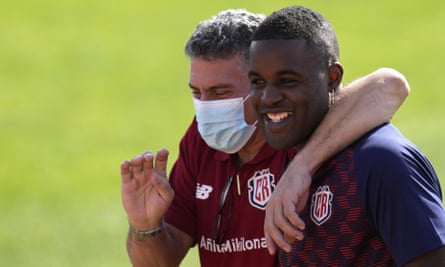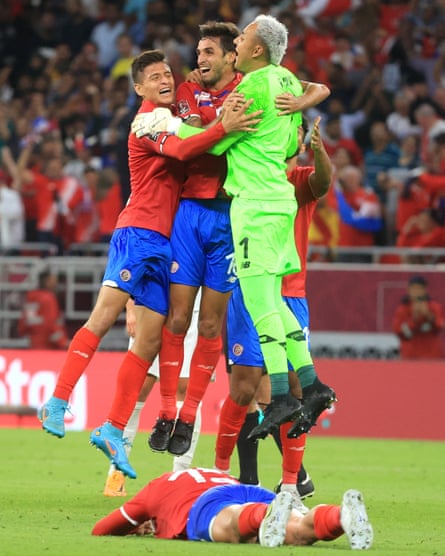The frightened face Luis Fernando Suárez feigns quickly slips into a smile. “I was scared,” the Costa Rica coach says, laughing. It was 1989, 10 days after he had been left out of the Atlético Nacional squad that became the first Colombian team to win the Copa Libertadores and the manager called. Francisco Maturana told Suárez he was leaving to focus on the national team and he wanted him to join his assistant Hernán Gómez in taking his place. “That morning I trained with my teammates; that afternoon they introduced me as coach,” he recalls. “Maturana believed in me before I did.”
Well, sort of. “One day I asked him what he had seen in me,” Suárez says. “And he said: ‘The thing is, you were such a bad player and such a good person that it was the only way to get you to retire.’” He laughs but Maturana, Colombia’s coach at the 1990 and 1994 World Cups as well as Ecuador’s in 1998, when he made Suárez assistant, was right. On Wednesday afternoon, the 62-year-old will lead out Costa Rica, the third country he has qualified for a World Cup with, after Ecuador in 2006 and Honduras in 2014, to face Spain. It has become an “obsession”, he says.
“Obsession is a positive thing. When I reached my first World Cup, I went round with a tape recorder like a journalist, but only asking one question: ‘Profe, help me with your experience. If you went to a World Cup again, what would you do?’ I saw Menotti, Bilardo, Basile, Queiroz. They opened up but when I got there I lived something I had never experienced – I was pretty bad, so it was quite hard for me to go to a World Cup – and couldn’t believe it. In Germany, I saw all these great things and ...”
Quick GuideQatar: beyond the football
Show

It was a World Cup like no other. For the last 12 years the Guardian has been reporting on the issues surrounding Qatar 2022, from corruption and human rights abuses to the treatment of migrant workers and discriminatory laws. The best of our journalism is gathered on our dedicated Qatar: Beyond the Football home page for those who want to go deeper into the issues beyond the pitch.
Guardian reporting goes far beyond what happens on the pitch. Support our investigative journalism today.
Suárez shakes his head. “I said to myself: ‘This won’t be my only World Cup. It can’t be. I want more.’ Luckily, I had Honduras and now Costa Rica and the obsession grows. This time, people were saying: ‘You’re not going to do it,’ the situation wasn’t good, but there was a moment where I thought: ‘Yes, we can do this,’ where I returned to that obsession.”
Costa Rica won only one of their first seven qualifying games. “I was ill with Covid, at home, alone,” Suárez recalls. “It’s a moment where you chuck it all away or drag yourself through. I chose drag through. I got this obsessive feeling again, and wanted to transmit that to the players. There’s a group who want the same, a synergy. I remember Keylor Navas saying: ‘I’m here to fight.’ And this very interesting emotional state was created.”
They won six and drew one of their final seven games, reaching the playoff against New Zealand. On Suárez’s fridge are the arts and crafts his grandson made; in the middle of them are also four magnets: Spain, Germany, Japan and Costa Rica, placed there on the day of the World Cup draw in April. “It was never ‘New Zealand or Costa Rica’, just Costa Rica,” he says; every time he went to the fridge for two months, he saw it. In June, Joel Campbell’s goal took them to Qatar. The magnets stayed.
“It was a difficult year; to arrive at a place I didn’t know,” Suárez says, yet it is a familiar process. After all, this is the third country he has taken to a World Cup, and none have been his own. “The timing didn’t fall right with Colombia,” he says. “There was a moment they offered but I was very raw, didn’t have the experience. I’d only been assistant. It was 1999, I called my dad. ‘What do you think?’ He said: ‘There are canons aiming at [coach] Javier Álvarez and all I see is them turning on you.’”
Suárez continues: “A few years later, when Ecuador came I felt ready. I had been assistant there, I had been at Aucas, I knew how the Ecuadorian thinks – not the player, the person. That’s important: to understand them, the idiosyncrasies, to have the plasticity to adapt. Honduras signed me in advance: I had a year, two, to get to know them. With Costa Rica, it was a crash course. You have to learn about them.”

“I spoke to the coach of the Costa Rican golf team. He said the Costa Rican golfer is different to the American golfer: he tries to get the ball closer to the hole, the American hits to the hole. That’s the Costa Rican: careful, cautious. I like how they are. Without being a rich country, it’s an equalitarian country, without such difference between classes. Pura vida. They told me: ‘When we got independence from the Spanish, we didn’t fight. The viceroy sent a letter saying we were free.’ Imagine it. There’s not even a fight for liberty.”
Suárez laughs. “And the best thing was they took their time replying to say whether they accepted. You have to understand and use that character. You’re not there to indoctrinate. Some coaches say: ‘What I say is everything.’ I totally oppose that. I want the team to be a mental state that’s achieved when everyone feels heard, personally important, owners of their destiny, personified in the team.”
He discusses sessions that provide structure but foster freedom, autonomous decision-making, problems put there to be overcome. There’s an enthusiasm for leftfield ideas, mental games. Introduced to Three Sided Football, he may try it. He describes practice games in which players don’t know who’s on their team or that are conducted in silence. There’s a glint in his eye going, an idea underpinning it all: players thinking, taking agency.
“If players just do what we say they end up as robots,” he says. “We have to humanise this. Us coaches are guilty of thinking about the move and not about the player: how he is, how he feels. We create a situation where he runs football, he doesn’t play football. Latin Americans have tried to be more European but we lost our essence: joy, creativity. We’ve put on a suit that doesn’t fit; the Latin American is badly dressed.”
Suárez continues: “The most important thing is listen, find complicity. I spoke to Keylor and saw a fervent desire to qualify. I said: ‘Me too.’ Two people obsessed with reaching the World Cup. Others are intelligent managing the group too, like Bryan Ruiz, Celso Borges, Bryan Oviedo. It’s absolutely an advantage having that generation. Look at Joel Campbell. At Arsenal I always saw someone who could stand out; now although he’s only 30 I see a mature man aware of where he’s going. And the most important thing is those players teach. They’ve taken kids aged 19, 20 and practically adopted them.

“Navas is a warrior, a role model, not just for Costa Rica but Central America. He’s won three Champions Leagues but doesn’t want to be the star: if the opponents are throwing stones at the ranch and he’s saving everyone, he’s not happy. When he brings a signed PSG shirt and raffles it among the youngest players, he’s doing something no coach can. I can’t achieve what he does with an embrace or a gesture. Just him being there is so valuable.”
Navas has also been here before. As the fridge magnets testify, Costa Rica could hardly have a more difficult group. “Magnifico!” Suárez says, mock rolling his eyes. But in 2014, Costa Rica got out of their group ahead of England and Italy. “There are five or six who know how to approach this. Because it’s happened before doesn’t mean it will again, but their experience brings calm to others. They ask: ‘How can we do this? Is it possible?’ Yes, it’s possible.
“We’re conscious that others are favourites but we want to compete. There was a catharsis in qualification, from six points in seven games to 19 in 21. Against New Zealand people thought we only had to turn up to go through, but we were very serious. Right now, I see a group that has the same concentration, focus, commitment.”
They also have Suárez’s red Converse boots, worn every game and so lucky that he couldn’t take them off if he wanted to. “The players oblige me to wear them – I could be naked, so long as I wore them,” he says. “There’s no sponsorship deal. I started wearing them because I had a foot problem, had to use a splint and needed something that held it in place. I’ll enjoy wearing them at another World Cup.”
So famous have the shoes become that before the tournament Suárez presented the country’s president, Rodrigo Chaves, with an identical pair. Do well now in Qatar and they’ll end up in a museum. Costa Rica’s coach laughs. “Yeah,” he says, “and if we do badly, I’ll have to use them to run away.”
